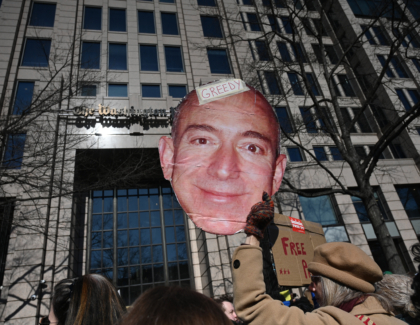Sign up for the daily CJR newsletter.
After watching yesterday’s White House press briefings, in which reporters hammered Scott McClellan for refusing to answer questions about Karl Rove’s involvement in leaking the name of an undercover CIA officer — an involvement that McClellan and Rove had previously denied — we were all set to smack reporters around for their subsequent stories about the exchange.
Why? Time and again we’ve seen reporters get feisty at press conferences, asking hard questions and betraying their skepticism at administration spin, only to then offer up tentative pieces in print — pieces that fail to convey the obfuscation coming from the podium. We feared that they’d unload their anger on McClellan only to return to their computers to turn out stories treating the White House’s patently absurd refusal to engage the issue as standard-issue, unobjectionable damage control that reflected the realities of doing business in Washington.
We’re happy to say we were wrong.
The press came out firing today with stories that reflected the frustration that prompted an exasperated NBC’s David Gregory to tell McClellan, in the press conference, “This is ridiculous.” Check out the lede in the New York Times’ page one lead story: “Nearly two years after stating that any administration official found to have been involved in leaking the name of an undercover C.I.A. officer would be fired, and assuring that Karl Rove and other senior aides to President Bush had nothing to do with the disclosure, the White House on Monday refused to answer any questions about new evidence of Mr. Rove’s role in the matter.” The Washington Post put a story headlined “Bush Aide Deflects Questions On Rove” on its front page, leading with the fact that “President Bush’s aides put up a wall” and detailing how reporters quoted McClellan’s own words of two years ago back to him. The Post also ran a merciless column by Dana Milbank on the dustup. Here are two sample grafs:
The 32-minute pummeling was perhaps the worst McClellan received since he got the job two years ago. His eyes were red and tired. He wiggled his foot nervously behind the lectern and robotically refused to answer no fewer than 35 questions about Rove and the outing of the CIA’s Valerie Plame. Twenty-two times McClellan repeated that an “ongoing” investigation prevented him from explaining the gap between his past statements and the facts.
In September 2003, McClellan stated flatly that anybody found to be involved in the Plame unmasking “would no longer be in this administration.” He said that any suggestion of Rove’s involvement was “ridiculous.” But in recent days, Rove’s lawyer and an internal Time magazine email confirmed that Rove told Time that the wife of administration critic and former ambassador Joseph C. Wilson IV was with the CIA.
Snap!
But we’re just getting warmed up. The Associated Press — in a story picked up by CNN.com, CBS News, and countless others — led with, “For two years, the White House has insisted that presidential adviser Karl Rove had nothing to do with the leak of a CIA officer’s identity. And President Bush said the leaker would be fired.” The AP also compiled “CIA Leak Quotes,” dating back to September of 2003, that showed McClellan’s contradictory statements. NBC’s “Nightly News,” with just the tiniest flicker of self-congratulation, ran a solid piece about the White House’s refusal to engage the issue that showed NBC’s own Gregory hammering Rove in the briefing. The other networks ran similar segments.
CBS’ John Roberts even used the words “demonstrably false.”
Not all of the coverage has been so sterling — USA Today‘s rather toothless 2A piece springs to mind — but, overall, reporters have done a hell of a job with the story. And they show no signs of letting up: The second story down on the New York Times Web site at the moment is “White House Silence on Rove’s Role in Leak Enters 2nd Day,” which details how President Bush today twice ignored questions about whether or not he would fire Rove.
Incidents like this remind us that reporters really do want to do what reporters should do — hammer hypocrisy, discover the facts, and write stories that level with readers. But cowed by bias charges and handcuffed by conventions that keep reporters from calling a lie a lie, all too often they shy away from writing stories that cut through the bullshit.
In this case, by taking a patently ridiculous stand on a high-profile issue, the White House has given them red meat — something all but the most timid can really sink their teeth into.
Sure, the media bias warriors will bray, but on this one, their criticism is going to ring particularly hollow. (As Charles Madigan — as apolitical a columnist as you can find — dryly noted today in the Chicago Tribune, it’s not liberalism that the bias warriors hate — it’s journalism.)
Here’s hoping all the reporters involved don’t spoil their strong start by backing off and wasting an opportunity to remind Americans why we so desperately need a strong and serious media.
–Brian Montopoli
Has America ever needed a media defender more than now? Help us by joining CJR today.






